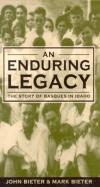 |

|
 |
buber.net > Basque > Features > Books > Book Review: An Enduring Legacy by John and Mark Bieter
For security reasons, user contributed notes have been disabled.
Book Review: An Enduring Legacy by John and Mark Bieter
by Blas Pedro Uberuaga June 28, 2003
Read: September, 2000.
 I felt that this was a very good overview of the Basque experience in
America, specifically Idaho. It gave me some idea of the experiences
the men who came before my father had. My father is of the second
generation of Basque immigrants, of the time when the three year
contracts were in force and a Basque network was already in place.
The greater uncertainty felt by the men and women who came at the
beginning of the twentieth century must have been orders of magnitude
greater than for my father, though the potential rewards were also
greater. I felt that this was a very good overview of the Basque experience in
America, specifically Idaho. It gave me some idea of the experiences
the men who came before my father had. My father is of the second
generation of Basque immigrants, of the time when the three year
contracts were in force and a Basque network was already in place.
The greater uncertainty felt by the men and women who came at the
beginning of the twentieth century must have been orders of magnitude
greater than for my father, though the potential rewards were also
greater.
The Bieters give a good overview of the histories of the Basques,
starting with a story about Jose Navarro (who was the uncle of my
great-grandmother). They give a good history of the efforts of both
the original immigrants and their decendants' to keep at least some
aspects of Basque culture alive. They do point out, in a way that
makes me look at my own choices, that the aspects of Basque culture
that have survived in America are those that are easy to continue,
that the are convenient for people who want a Basque connection, but
don't have the time or want to put forth the effort to, for example,
learn the language. I see this as a call, to me at least, to try to
strengthen my knowledge of not only the language, but also the history
and culture of my ancestors.
They give some history of the involvement of Idaho Basques in the
politics of Euskadi that I hadn't known of before (Anaik Denok), but
found very interesting.
Reading the parts about the industrialization of the Basque Country, I
felt that there were connections between the Basque Country and the
Latin American countries similar to the point of view discussed in
Che Guevara by Jon Lee Anderson. The industrialists, much as
the capitalists of the US and the ruling elite of Latin America, cared
little for the majority of the Basques, the rural Basques, but that
Sabino Arana, the Basque nationalist, was much like Che in that he
came from the elite group and idealized the rural peasants and wanted
to change life for them without necessarily consulting with them. It
is also interesting to note that ETA was born not too long after the
Cuban Revolution.
I found this to be a quick read but an interesting one, that gave me
some very good insights into the Basque-Idaho background that I hadn't
known before. It is a very good introduction to what it means to be
Basque-American and why some of us choose to identify with both the
Basque and American culture. I strongly recommend this book, not only
to Americans of Basque decent, but anyone who is interested in the
issues of ethnicity in America and why some would choose to be both
American and ethnic at the same time.
This page is part of Buber's Basque Page and is maintained by Blas Uberuaga.
Please report any problems or suggestions to Blas.
Eskerrik asko!
|
|
 |







 I felt that this was a very good overview of the Basque experience in
America, specifically Idaho. It gave me some idea of the experiences
the men who came before my father had. My father is of the second
generation of Basque immigrants, of the time when the three year
contracts were in force and a Basque network was already in place.
The greater uncertainty felt by the men and women who came at the
beginning of the twentieth century must have been orders of magnitude
greater than for my father, though the potential rewards were also
greater.
I felt that this was a very good overview of the Basque experience in
America, specifically Idaho. It gave me some idea of the experiences
the men who came before my father had. My father is of the second
generation of Basque immigrants, of the time when the three year
contracts were in force and a Basque network was already in place.
The greater uncertainty felt by the men and women who came at the
beginning of the twentieth century must have been orders of magnitude
greater than for my father, though the potential rewards were also
greater.





